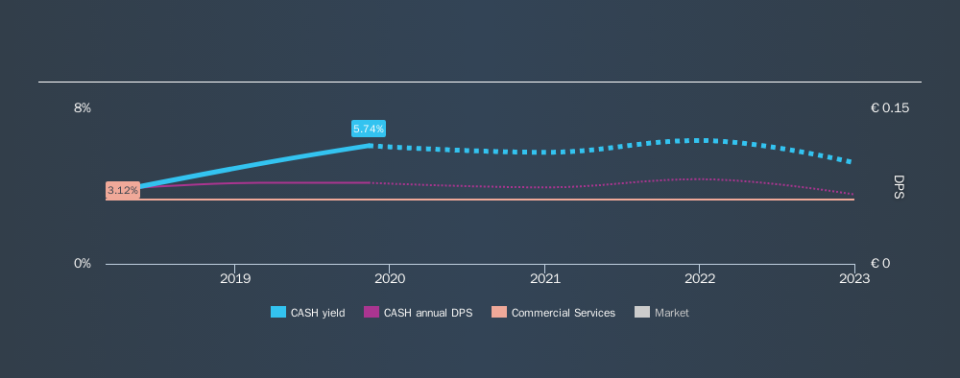Do Investors Have Good Reason To Be Wary Of Prosegur Cash, S.A.'s (BME:CASH) 5.7% Dividend Yield?

Dividend paying stocks like Prosegur Cash, S.A. (BME:CASH) tend to be popular with investors, and for good reason - some research suggests a significant amount of all stock market returns come from reinvested dividends. Yet sometimes, investors buy a stock for its dividend and lose money because the share price falls by more than they earned in dividend payments.
Prosegur Cash pays a 5.7% dividend yield, and has been paying dividends for the past two years. It's certainly an attractive yield, but readers are likely curious about its staying power. Some simple analysis can offer a lot of insights when buying a company for its dividend, and we'll go through this below.
Explore this interactive chart for our latest analysis on Prosegur Cash!
Payout ratios
Companies (usually) pay dividends out of their earnings. If a company is paying more than it earns, the dividend might have to be cut. Comparing dividend payments to a company's net profit after tax is a simple way of reality-checking whether a dividend is sustainable. Prosegur Cash paid out 74% of its profit as dividends, over the trailing twelve month period. This is a healthy payout ratio, and while it does limit the amount of earnings that can be reinvested in the business, there is also some room to lift the payout ratio over time.
Another important check we do is to see if the free cash flow generated is sufficient to pay the dividend. Prosegur Cash paid out 123% of its free cash flow last year, suggesting the dividend is poorly covered by cash flow. Prosegur Cash paid out less in dividends than it reported in profits, but unfortunately it didn't generate enough free cash flow to cover the dividend. Cash is king, as they say, and were Prosegur Cash to repeatedly pay dividends that aren't well covered by cashflow, we would consider this a warning sign.
We update our data on Prosegur Cash every 24 hours, so you can always get our latest analysis of its financial health, here.
Dividend Volatility
One of the major risks of relying on dividend income, is the potential for a company to struggle financially and cut its dividend. Not only is your income cut, but the value of your investment declines as well - nasty. The company has been paying a stable dividend for a few years now, but we'd like to see more evidence of consistency over a longer period. During the past two-year period, the first annual payment was €0.072 in 2017, compared to €0.079 last year. Dividends per share have grown at approximately 4.8% per year over this time.
We like that the dividend hasn't been shrinking. However we're conscious that the company hasn't got an overly long track record of dividend payments yet, which makes us wary of relying on its dividend income.
Dividend Growth Potential
Dividend payments have been consistent over the past few years, but we should always check if earnings per share (EPS) are growing, as this will help maintain the purchasing power of the dividend. Over the past five years, it looks as though Prosegur Cash's EPS have declined at around 17% a year. A sharp decline in earnings per share is not great from from a dividend perspective, as even conservative payout ratios can come under pressure if earnings fall far enough.
Conclusion
Dividend investors should always want to know if a) a company's dividends are affordable, b) if there is a track record of consistent payments, and c) if the dividend is capable of growing. First, we think Prosegur Cash has an acceptable payout ratio, although its dividend was not well covered by cashflow. Earnings per share have been falling, and the company has a relatively short dividend history - shorter than we like, anyway. There are a few too many issues for us to get comfortable with Prosegur Cash from a dividend perspective. Businesses can change, but we would struggle to identify why an investor should rely on this stock for their income.
Without at least some growth in earnings per share over time, the dividend will eventually come under pressure either from costs or inflation. See if the 9 analysts are forecasting a turnaround in our free collection of analyst estimates here.
If you are a dividend investor, you might also want to look at our curated list of dividend stocks yielding above 3%.
We aim to bring you long-term focused research analysis driven by fundamental data. Note that our analysis may not factor in the latest price-sensitive company announcements or qualitative material.
If you spot an error that warrants correction, please contact the editor at editorial-team@simplywallst.com. This article by Simply Wall St is general in nature. It does not constitute a recommendation to buy or sell any stock, and does not take account of your objectives, or your financial situation. Simply Wall St has no position in the stocks mentioned. Thank you for reading.


